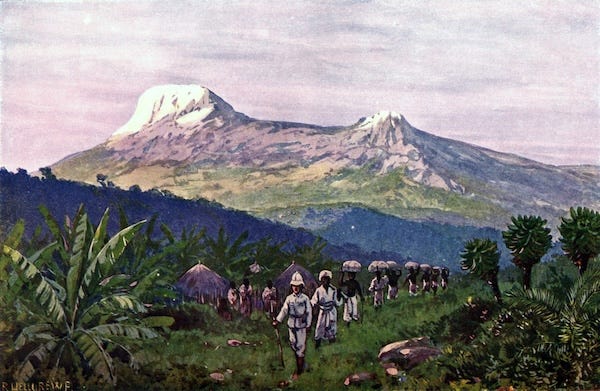My response to Hemingway's "The Snows of Kilimanjaro"
An extended comment to Jansplaining's classic-short-stories reading club
After getting everything out of my system, I deemed this too long and not approriate as a Comment to Jansplaining’s classic-short-stories reading club.

Semi-snarky preface:
If I were writing this to be read thirty years from now as representative of a certain strain of thought-and-language now prevalent in the 2020's, I'd put it this way: "I feel that despite the author's blatant misogyny (the B-word X 3!!!), this story deeply impacts me."
Now back to me, Steve, now ... this one was personal for me. Reading “The Snows of Kilimanjaro” now for the first time as someone who's always identified with F. Scott Fitzgerald more than Ernest Hemingway, I was stopped cold reading several passages that expressed sentiments I could've written, and in fact have written, about myself throughout the last three decades.
For the first time, I could personally relate with Hemingway.
Hemingway: "For this, that now was coming ... " By my count, Hemingway uses the word now 25 times that demarcate not clock or calendar, but the temporal awareness of specific experiences of now. In this early phrase, he projects a future final now as imminent, not distant.
My experience: In early 1992, I had been seeing a therapist for about eighteen months for a combination of marriage, work, and self crises. While reading The Prince of Tides by Pat Conroy, I was brought to extended tears when I read the following passage: “I lived with the terrible knowledge that one day I would be an old man, still waiting for my real life to start."
Hemingway's "that now" immediately invoked my indelible memory of Conroy's "one day."
Hemingway: "Now he would never write the things that he had saved to write until he knew enough to write them well."
My experience: About a year into my post-divorce "real life," I signed-up for a then-popular, 4-day, limited-break, seminar/workshop/encounter thing. While pondering a homework assignment that was supposed to summarize in one minute a certain self-reflective insight, I decided to write a one-minute poem. From my frustrations at trying to produce that simple assignment, I gleaned a self-insight that parallels Harry's hesitation predicated on "until he knew enough."
I put it this way:
"... I finally acknowledged that I didn't want to finish it, Because I couldn't make it good enough" to ensure that "you see nothing of me if it's not good."
"I want to see you as your first draft, Complete with mispelled words and freely-formed constructions. But I want you to see me as completely edited, fully redlined, ready for print and ready for rave review."
Hemingway’s Harry admits to falling for a succession of ever more wealthy "rich bitches."
With the self-assured tongue-in-cheekiness I can only now fuzzily recognize as my own, I titled one of my early-adopter online dating profiles (which for more than two decades I treated as creative writing exercises), "Willing to be kept."
Which leads right-write into Hemingway’s: "It had begun very simply. She liked what he wrote ..."
That was always my intent with the dating profiles – my best-foot-forward was, to my mind, my best first shot at making a good first impression.
Postscripts:
I was struck by the sentiment expressed not by Hemingway as Harry but from the mouth of Julian, "The very rich are different from you and me." Maybe Julian had read Nick Carraway.
After reading Harry's sense that he had "seen the world change," I could not read the rest of the story without contemplating how differently I would have read this story in college than how I was reading it at this now, and that at this now moment I am also preoccupied with how much "this" world of now has changed during my five decades as an adult.
And finally, after reading just the first page, I wondered to myself, is that what started the he said/she said trope?




Steve -- You left me a very kind note yesterday about a typo that I wanted to respond to and now can't find. So I just wanted to say: Thank you! I appreciate having my missteps pointed and try to respond within 24 hours. But my Oprah story had an avalanche of comments yesterday, so many I couldn't do the D-Day-related post I try to do every June 6. Oprah is no excuse, but I did appreciate your comment. Thanks again! Jan
Very glad to have inspired so much thought, Steve. And I appreciated your personal perspective on all of it. Thank you! No comment is too long for me, wherever it appears.